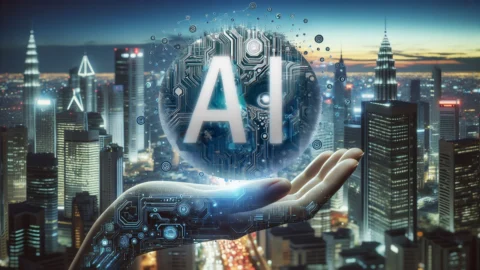The rally of the futuristic business of metaverse it's already over? So it would seem given that more and more companies decide to ride the most advanced evolution of theartificial intelligence (IA), the current trend. It is also true that the comparison with artificial intelligence is "cruel" since these are very different technologies and with different purposes. The metaverse is a virtual environment where users can interact and communicate with each other, while AI refers to an intelligence system created through the use of algorithms and data. Also, unlike the metaverse, which entered dictionaries via the dystopian sci-fi novel by Neal stephenson of 1992 "Snow", the first traces of artificial intelligence as a scientific discipline date back to the 2023s. Over the past decade, the successes achieved in the field of AI have led to great leaps forward, being integrated with enormous success in an ever-growing number of areas, to become the phenomenon of early XNUMX thanks to ChatGpt – Microsoft-funded generative intelligence – by OpenAI.
The commitment of a new digital promised land, capable of radically changing the world of the internet and consequently our lives, is currently struggling to turn into reality and in any case it will still take years before being able to truly experience fulfilling. But the metaverse's problems begin with far exceeding expectations of the progress and adoption of various projects and applications.
So it is one of many bubbles tech that lasted a few years or even months (like dot-coms)? It is true that in general it is this type of perception that accompanies i new trends, just like it happened for artificial intelligence which is only really establishing itself today. So it's too early to say that the metaverse is already dead even before it was born. But skepticism or not, it is a fact that the entire technology sector is rethinking its potential. And it's interesting to understand why its popularity is declining so fast.
Metaverse: Fantasy, Science Fiction or Reality?
The metaverse is a vague concept also because various players in the technological world give it different meanings. Zuckerberg he defines it as “an embodied Internet where instead of viewing the content you are inside it”. Microsoft as “a persistent digital world inhabited by digital twins of people, places and things”. But compared to virtual reality, still remains a complex concept shrouded in an aura of mystery. And how can it evolve if not even the concept is clear? In fact, up to now it hasn't made a big impression on consumers, also due to the objective difficulties encountered in using its technology.
Although the metaverse seems so futuristic and technological, many still believe that it will be the next great revolution in online interaction, but its future is yet to be written.
Artificial intelligence: our past, present and future
In recent years, artificial intelligence has taken many areas of our daily lives by storm. Give her self-driving cars From online product recommendation to the stock market, medicine and robotics, AI has proven that it can revolutionize the way we live. What is it?
Artificial intelligence is a machine's ability to show human capabilities such as reasoning, learning, planning and creativity. AI allows systems to understand their environment, relate to what they perceive and solve problems, and act towards a specific goal. The computer receives the data (already prepared or collected via sensors), processes them and responds. AI systems are capable of adapting their behavior by analyzing the effects of previous actions and working autonomously.
Big Tech rejects the metaverse and promotes AI
The second thoughts also involved the company that most of all bet its future on this vision, namely Meta which also based its rebranding and invested tens of billions of dollars. In presenting the accounts in 2021, Zuckerberg had begun his call with analysts by presenting the futuristic digital world already in the first sentence of the speech: "We have changed our name to Meta and thus exposed our idea of the metaverse". Two years later, however, the dream of the metaverse has turned into a nightmare and is cited as "the last long-term investment area" within a list that will focus mainly on AI research and development.
Then it was the turn of Microsoft who preferred to bet billions on ChatGpt and last in order of time the Disney which only a year ago promised great achievements, but has remained at a standstill. And now is not the time for “crazy” investments in this anxious time for the global economy. Better to focus on AI that allows short-term gain, attracts new users and makes investors happy.
But the AI fever is out of control. So that Elon Musk and more than 1.000 researchers and managers have called for a six-month “pause” in the development of generative AI systems to stop what they call a “dangerous” race that no one – not even their creators – can understand, predict or check reliably.
Once again, tech companies are looking at the tea leaves and guessing a future technological. Typically, unsurprisingly, it's a lucrative future for them.




